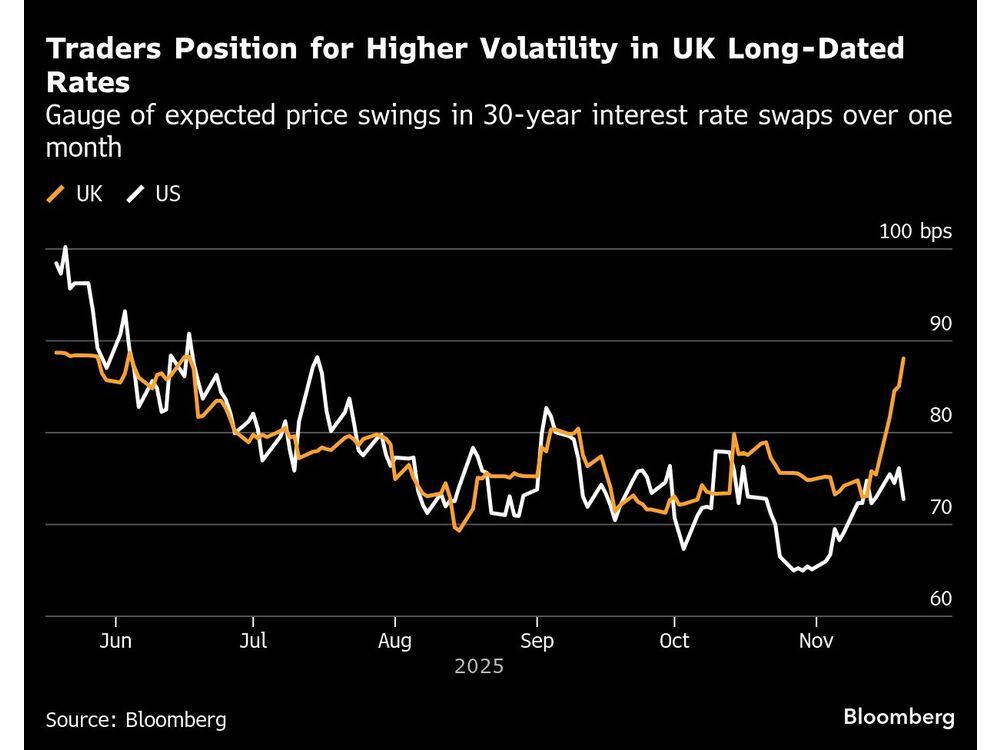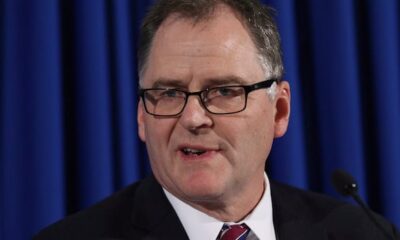Top Stories
UK Chancellor Rachel Reeves Faces £30 Billion Budget Crisis Now

UPDATE: UK Chancellor Rachel Reeves is facing an urgent financial crisis as she prepares to deliver a budget that must secure an astonishing £30 billion ($39 billion) to stabilize the nation’s finances. This budget, scheduled for November 26, 2024, comes amid intensifying pressure from both political allies and financial markets.
Just days before the announcement, Reeves was dealt a crucial blow when it was revealed that the fiscal outlook was better than previously anticipated, allowing her to avoid raising income taxes—a move that would have broken key electoral promises. However, the political landscape is shifting rapidly, with Keir Starmer’s leadership under threat from within the Labour Party, complicating Reeves’ fiscal strategy.
Markets reacted swiftly to the news, with bond investors expressing growing uncertainty about the government’s direction. Analysts warn that failure to deliver a credible budget could lead to a significant market shock, reminiscent of the turmoil following former Prime Minister Liz Truss’s unfunded tax cuts in 2022.
The stakes are extraordinarily high. Reeves must navigate a complex political environment while ensuring that her budget addresses rising inflation and secures investor confidence. The Labour Party, once buoyed by a decisive election victory last year, is now grappling with plummeting poll numbers and internal dissent from backbenchers who demand more progressive policies.
“Politically, she is trying to thread a needle through a trilemma,” stated Mathew Lawrence, director of the left-wing think tank Common Wealth. “The bond markets, the manifesto, and the pressure to do something on living standards that stops the chronic bleed out of support on the left.”
Reeves initially promised to avoid more borrowing or tax hikes, but the shifting political winds have forced her to reconsider. The urgency of raising £30 billion necessitates exploring a variety of smaller tax adjustments, each riskier than a straightforward income tax increase.
As the budget approaches, Reeves needs to reassure bond investors who are increasingly wary of the UK’s fiscal stability. With the Office for Budget Responsibility revising its productivity forecasts downward, the pressure mounts for Reeves to find substantial savings and present a coherent plan that mitigates economic risks.
This budget will not only determine the financial trajectory of the UK but could also have lasting implications for Starmer’s leadership. As public discontent grows, Labour’s traditional two-party dominance is under threat, with new populist movements emerging on both extremes of the political spectrum.
If Reeves fails to deliver a budget that stabilizes the economy and addresses public concerns, it could mark the beginning of a downward spiral for both her career and Starmer’s leadership. With mounting pressure from both the public and her own party, all eyes are on Reeves as she prepares for one of the most critical moments of her political life.
As the November 26 deadline approaches, the financial landscape remains precarious. The implications of Reeves’s decisions could reverberate across the UK economy, impacting inflation, investment, and public trust in the Labour government.
Stay tuned for live updates as this story continues to develop, and watch for Reeves’ critical budget announcement next week, which could redefine the future of the Labour Party and the UK’s economic stability.
-

 Politics2 weeks ago
Politics2 weeks agoSecwepemc First Nation Seeks Aboriginal Title Over Kamloops Area
-

 World4 months ago
World4 months agoScientists Unearth Ancient Antarctic Ice to Unlock Climate Secrets
-

 Entertainment4 months ago
Entertainment4 months agoTrump and McCormick to Announce $70 Billion Energy Investments
-

 Lifestyle4 months ago
Lifestyle4 months agoTransLink Launches Food Truck Program to Boost Revenue in Vancouver
-

 Science4 months ago
Science4 months agoFour Astronauts Return to Earth After International Space Station Mission
-

 Technology3 months ago
Technology3 months agoApple Notes Enhances Functionality with Markdown Support in macOS 26
-

 Top Stories1 month ago
Top Stories1 month agoUrgent Update: Fatal Crash on Highway 99 Claims Life of Pitt Meadows Man
-

 Sports4 months ago
Sports4 months agoSearch Underway for Missing Hunter Amid Hokkaido Bear Emergency
-

 Politics4 months ago
Politics4 months agoUkrainian Tennis Star Elina Svitolina Faces Death Threats Online
-

 Politics4 months ago
Politics4 months agoCarney Engages First Nations Leaders at Development Law Summit
-

 Lifestyle2 months ago
Lifestyle2 months agoManitoba’s Burger Champion Shines Again Amid Dining Innovations
-

 Technology4 months ago
Technology4 months agoFrosthaven Launches Early Access on July 31, 2025





















